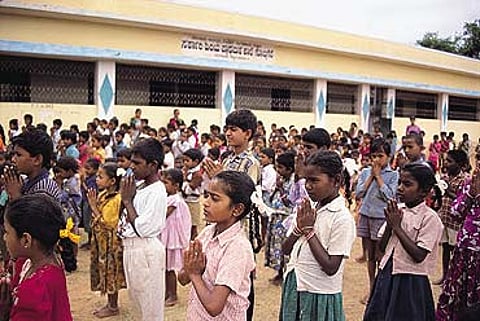Is Deccan Plateauing?
The four states are still ahead of the rest in socio-economic indices. But new-age pressures are checking their surge of late.

However, there is still a lack of understanding about the implications of falling fertility rates, which are now below replacement levels in Kerala and Tamil Nadu. Planning Commission officials say it is imperative to address the issue of changing demographics in the south. Some experts feel the accent now is on traditional models like pension, and not on care and security of old people.
Apart from administration, the south has also been able to involve the locals in developmental work. "Social movements and community mobilisation, especially by women self-help groups, are seeingimprovement--be it Kudumbasree in Kerala or Indira Kranti Pathakam in Andhra Pradesh," notes R. Radhakrishna, director of Indira Gandhi Institute of Development Research, Mumbai. In Tamil Nadu and Karnataka too, such community groups are proving to be key agents of change.
Karnataka is one example of a state that is willing to borrow plans or policies from others. It has adopted the Andhra Pradesh model of greater community stake in development of water bodies. Karnataka can also take credit for attempting to provide better training facilities for the disabled. This was led by Bangalore slum-dwellers, who formed 11 forums and used the RTI Act to lobby for their rights. "Many applications were submitted. Some departments did respond positively," says Sudha K. of the Centre for Advocacy and Research.
However, in recent times, rapid and impressive growth in the four states has taken a toll on the social infrastructure. Much of this is fuelled by a knowledge-based economy and the private sector, feel experts. "It's in a way undoing what was attempted during the 1970s and early '80s through land reforms and pro-poor social welfare," says Karanth. So, we now have a situation where the four states, which contribute about 22 per cent of India's gross domestic product, are witnessing the birth of a whole new generation reduced to or getting born into poverty.
One of the problem areas is urbanisation. As UNFPA (India) representative Nesim Tumkaya notes, "Urbanisation is inevitable. The majority of problems troubling us could be resolved by taking a long-term outlook of 10-15 years as has been done in Singapore and is being done in Botswana's capital." Union minister Jaipal Reddy stresses that irrespective of the region, his urban development ministry has to offer "carrots to get state governments to respond to initiatives under the JNURM scheme" which is aimed at improving urban facilities like drinking water, sanitation and waste management.
Instead, most states, including the southern ones, think privatisation is the panacea to solve these problems. It's instructive to see its impact on an area like education. Initially, privatisation dramatically improved the quality of higher education, but eventually it engendered a new set of problems. D. Purandeswari, Union minister of state for HRD, agrees that the south "has been very strong in education, especially technical education. The entry of private players provided the impetus for faster growth." Overall, barring Andhra Pradesh, with 60.5 per cent literacy level, the other three have attained levels higher than the national average of 64.8 per cent.

Over time, however, intense commercialisation has led to a decline in quality. There has been a mushrooming of private fly-by-night operators. Says Saxena: "In health and education, increasing privatisation is not helping the poor as most can't afford to pay the user fee of hospitals or schools. Moreover, the private sector isn't regulated properly." Purandeswari too underlines the need for states to monitor the quality of education imparted through highly expensive private institutions.
Kerala, with the highest level of above 90 per cent literacy, has been doing well in primary and secondary education. But, as Union minister of state for human resource development (primary education and literacy) M.A.A. Fatmi notes, "In higher education and technical education, it isn't doing so well. Mostly it's because people opt for vocational courses, take up jobs overseas and, therefore, don't pursue higher education."
Thus, it is the right time for a reality check for the southern states. An advisor to the Planning Commission thinks that the south needs "to focus more on pockets of deprivation while continuing to maintain a high level of economic growth. To achieve this dual objective, the states need to work out areas of disparities. We are advocating they work on specific plans."
It is quite a Catch 22 situation for the south. Economically, the region is thriving, growing faster than ever before. Private investments are flowing into both manufacturing and services. Consumerism is on the rise and the southern states have become attractive markets. At the same time, they have some of the social indicesslipping--or going south.
Tags